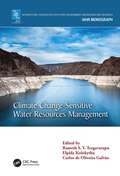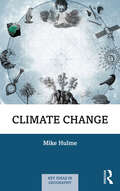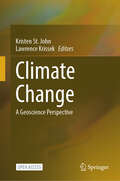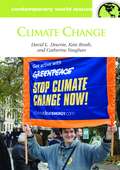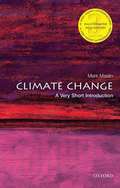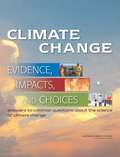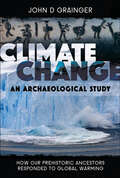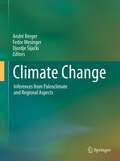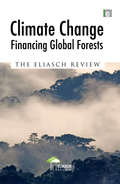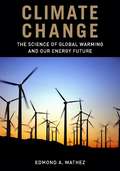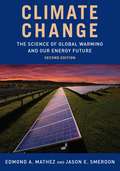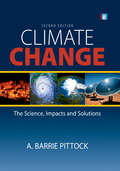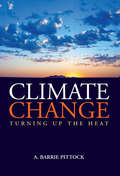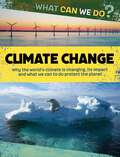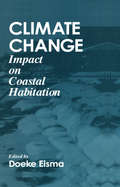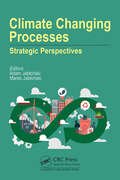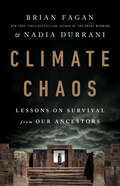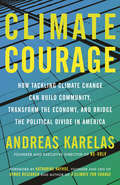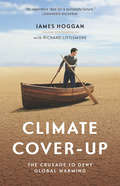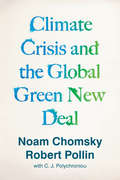- Table View
- List View
Climate Change-Sensitive Water Resources Management (IAHR Monographs)
by Ramesh S. V. Teegavarapu Elpida Kolokytha Carlos de Oliveira GalvãoThe book provides an overview of climate change-sensitive water resources management with consideration of adaptation approaches, the assessment of climate change impacts, current contemporary management techniques, and ecological responses. Comprehensive assessments and studies from eight countries using innovative approaches that aid water management under evolving climates are documented. Topics ranging from hydrologic design to management and policy responses to climate change are discussed, which demonstrate updated theories that highlight methods, tools, and experiences on the topic of water resources under climate change. The generic approaches discussed, and their applications to different climate change-related problems, make this book appealing to a global readership. The practical and applied methodologies presented in the book and through insightful case studies discussed will provide readers worldwide with ready-to-use information to manage water resources sustainably under evolving climate. This book is ideally suited for water resource managers, scientists, professionals from water management agencies, graduate students, and national laboratory agencies responsible for water and environmental management.
Climate Change: A Case Against Climate Engineering (Key Ideas in Geography)
by Mike HulmeWritten by a leading geographer of climate, this book offers a unique guide to students and general readers alike for making sense of this profound, far-reaching, and contested idea. It presents climate change as an idea with a past, a present, and a future. In ten carefully crafted chapters, Climate Change offers a synoptic and inter-disciplinary understanding of the idea of climate change from its varied historical and cultural origins; to its construction more recently through scientific endeavour; to the multiple ways in which political, social, and cultural movements in today’s world seek to make sense of and act upon it; to the possible futures of climate, however it may be governed and imagined. The central claim of the book is that the full breadth and power of the idea of climate change can only be grasped from a vantage point that embraces the social sciences, humanities, and natural sciences. This vantage point is what the book offers, written from the perspective of a geographer whose career work on climate change has drawn across the full range of academic disciplines. The book highlights the work of leading geographers in relation to climate change; examples, illustrations, and case study boxes are drawn from different cultures around the world, and questions are posed for use in class discussions. The book is written as a student text, suitable for disciplinary and inter-disciplinary undergraduate and graduate courses that embrace climate change from within social science and humanities disciplines. Science students studying climate change on inter-disciplinary programmes will also benefit from reading it, as too will the general reader looking for a fresh and distinctive account of climate change.
Climate Change: A Geoscience Perspective
by Lawrence Krissek Kristen St. JohnThis open access book on climate change assesses past climatic change from a geoscience perspective and directly and effectively addresses common misconceptions on climate and climate change. A geoscience perspective on the multiple causes, rates, and consequences of climate change is essential context to assess modern climate change and our role in it, as well as forecasting future climate conditions. Yet, most textbooks on climate change focus only on the very recent past (e.g., last century), are not sufficiently engaging for non-scientists, or explore paleoclimate science at a level too challenging for introductory students. In addition, a wide range of misconceptions and confusion exists in the general public about climate change. Correcting misconceptions is an essential aspect of education, but educational research has shown that it is challenging to achieve. This textbook includes introductions to each thematic Part, that directly identify relevant misconceptions and refute them with clear, concise messages (i.e., learning goals) that are grounded in science and expanded on in the supporting chapters. Such refutation-style approaches have been shown to be effective at addressing misconceptions. The book offers a clear trajectory of fundamental climate science concepts, which are most beneficially combined to provide a valuable geoscience perspective on the causes, rates, and consequences of climate change. It frames the collection of climate science chapters with impactful, relevant social science context: starting the book with a chapter that explores the reasons behind the disconnect between the scientific and public understanding of climate change, and ending the book with a discussion of the intersection of ethics and climate change. Short topical expansions or excursions are included as “boxes” within selected chapters. This book will serve as a basic resource for learning about the lessons that the paleoclimate record offers to evaluate the seriousness of modern and future climate change.
Climate Change: A Multidisciplinary Approach
by William James BurroughsProviding a concise, up-to-date presentation of current knowledge of climate change and its implications for society as a whole, this new edition has been thoroughly updated and extended to include the latest information. The text describes the components of the global climate, considers how the many elements of climate combine to define its behaviour, and reviews how climate change is measured. The author discusses how the causes of climate change can be related to the evidence of change, and modelled to predict future changes. This book is ideally suited for introductory courses in meteorology, oceanography, environmental science, earth science, geography, agriculture and social science. It contains review questions at the end of each chapter to enable readers to monitor their understanding of the materials covered. This book should appeal to an audience with a keen interest in all aspects of the climate change debate.
Climate Change: A Reference Handbook
by David Downie Kate Brash Catherine VaughanEnvironmental activists provide a reference summarizing the climate science and policy, historical developments, current controversies and debates, and proposed solutions. They also profile important people and organizations, identify publications and Web sites with more information, and provide a chronology and texts of relevant documents.
Climate Change: A Very Short Introduction (Very Short Introductions)
by Mark MaslinClimate change is one of the few scientific theories that makes us examine the whole basis of modern society. It is a challenge that has politicians arguing, sets nations against each other, queries individual lifestyle choices, and ultimately asks questions about humanity's relationship with the rest of the planet. The latest Intergovernmental Panel on Climate Change (IPCC) report states that the evidence for climate change is unequivocal; with evidence over the last 100 years of a 0.8°Celsius (C) rise in global temperatures and a 22 centimetres (cm) rise in sea level. <P><P> Climate change challenges the very way we organize our society. Not only does it challenge the concept of the nation-state versus global responsibility, but the short-term vision of our political leaders. Climate change also needs to be seen within the context of the other great challenges of the 21st century: global poverty, population growth, environmental degradation, and global security. To meet these 21st century challenges we must change some of the basic rules of our society, to allow us to adopt a much more global and long-term approach, and in doing so, develop a win-win solution that benefits everyone.
Climate Change: Evidence, Impacts, and Choices
by National Research CouncilWhat is climate? Climate is commonly thought of as the expected weather conditions at a given location over time. People know when they go to New York City in winter, they should take a heavy coat. When they visit the Pacific Northwest, they should take an umbrella. Climate can be measured as many geographic scales - for example, cities, countries, or the entire globe - by such statistics as average temperatures, average number of rainy days, and the frequency of droughts. Climate change refers to changes in these statistics over years, decades, or even centuries. Enormous progress has been made in increasing our understanding of climate change and its causes, and a clearer picture of current and future impacts is emerging. Research is also shedding light on actions that might be taken to limit the magnitude of climate change and adapt to its impacts. Climate Change: Evidence, Impacts, and Choices is intended to help people understand what is known about climate change. First, it lays out the evidence that human activities, especially the burning of fossil fuels, are responsible for much of the warming and related changes being observed around the world. Second, it summarizes projections of future climate changes and impacts expected in this century and beyond. Finally, the booklet examines how science can help inform choice about managing and reducing the risks posed by climate change. The information is based on a number of National Research Council reports, each of which represents the consensus of experts who have reviewed hundreds of studies describing many years of accumulating evidence.
Climate Change: How Our Prehistoric Ancestors Responded to Global Warming
by John D. GraingerHow prehistoric humans coped with the end of the last Ice Age—and catastrophic global warming.Global warming is among the most urgent problems facing the world today. Yet many commentators, and even some scientists, discuss it with reference only to the changing climate of the last century or so. John Grainger takes a longer view and draws on the archaeological evidence to show how our ancestors faced up to the ending of the last Ice Age, arguably a more dramatic climate change crisis than the present one. Ranging from the Paleolithic down to the development of agriculture in the Neolithic, the author shows how human ingenuity and resourcefulness allowed them to adapt to the changing conditions in a variety of ways as the ice sheets retreated and water levels rose. Different strategies, from big game hunting on the ice, nomadic hunter gathering, sedentary foraging, and finally farming, were developed in various regions in response to local conditions as early man colonized the changing world. The human response to climate change was not to try to stop it, but to embrace technology and innovation to cope with it.
Climate Change: How Our Prehistoric Ancestors Responded to Global Warming
by John D. GraingerHow prehistoric humans coped with the end of the last Ice Age—and catastrophic global warming.Global warming is among the most urgent problems facing the world today. Yet many commentators, and even some scientists, discuss it with reference only to the changing climate of the last century or so. John Grainger takes a longer view and draws on the archaeological evidence to show how our ancestors faced up to the ending of the last Ice Age, arguably a more dramatic climate change crisis than the present one. Ranging from the Paleolithic down to the development of agriculture in the Neolithic, the author shows how human ingenuity and resourcefulness allowed them to adapt to the changing conditions in a variety of ways as the ice sheets retreated and water levels rose. Different strategies, from big game hunting on the ice, nomadic hunter gathering, sedentary foraging, and finally farming, were developed in various regions in response to local conditions as early man colonized the changing world. The human response to climate change was not to try to stop it, but to embrace technology and innovation to cope with it.
Climate Change: Inferences from Paleoclimate and Regional Aspects
by André Berger Djordje Sijacki Fedor MesingerExperts in climate and water sciences from Canada, the United States, Brazil, Denmark, Germany, Belgium, France, Serbia, and other European countries and the UNESCO gathered at the Serbian Academy of Sciences and Arts on the occasion of the 130th birthday anniversary of the geophysicist Milutin Milankovitch. The collection of their presentations is opened by an update on the climate situation after the Fourth Assessment Report of the Intergovernmental Panel on Climate Change. Further topics include various issues of paleoclimatology, in particular as it helps reduce uncertainties from which prospects for climate change suffer; ecohydrology and climate change at the watershed scale; and regional climate models, which are discussed in terms of both their improved modeling and their use in studies of a polynya in the Antarctica and expected changes in the Mediterranean region.
Climate Change: The Eliasch Review
by Johan EliaschAn area of forest the size of England is cut down in the tropics each year. Forestry is responsible for a fifth of global carbon emissions - more than the entire world transport sector. Urgent action to tackle the loss of global forests needs to be a central part of any new international agreement on climate change. Climate Change: Financing Global Forests is an independent report commissioned by the UK Prime Minister to address this vitally important issue. It assesses the impact of global forest loss on climate change and explores the future role of forests in the international climate change framework, with particular emphasis on the role of international finance. It also looks at the economic and policy drivers of deforestation and describes the incentives required to ensure more sustainable production of agriculture and timber in order to meet global demand while reducing carbon emissions. The report draws on a wide range of international expertise and will have significant national, EU and international interest and influence. It includes new modelling and analysis of the global economic impact of continued deforestation and provides a comprehensive assessment of the opportunity and capacity-building costs of addressing the problem. It shows that the benefits of halving deforestation could amount to $3.7 trillion over the long term. However, if the international community does not act, the global economic cost of climate change caused by deforestation could amount to $12 trillion. In this comprehensive and detailed report, Johan Eliasch makes a clear and forceful case for forests to be included in international carbon trading mechanisms. He calls for the international community to support forest nations to halve deforestation by 2020 and to make the global forest sector carbon neutral by 2030.
Climate Change: The Science of Global Warming and Our Energy Future
by Edmond A. MathezClimate Change is geared toward a variety of students and general readers who seek the real science behind global warming. Exquisitely illustrated, the text introduces the basic science underlying both the natural progress of climate change and the effect of human activity on the deteriorating health of our planet. Noted expert and author Edmond A. Mathez synthesizes the work of leading scholars in climatology and related fields, and he concludes with an extensive chapter on energy production, anchoring this volume in economic and technological realities and suggesting ways to reduce greenhouse-gas emissions. Climate Change opens with the climate system fundamentals: the workings of the atmosphere and ocean, their chemical interactions via the carbon cycle, and the scientific framework for understanding climate change. Mathez then brings the climate of the past to bear on our present predicament, highlighting the importance of paleoclimatology in understanding the current climate system. Subsequent chapters explore the changes already occurring around us and their implications for the future. In a special feature, Jason E. Smerdon, associate research scientist at Lamont-Doherty Earth Observatory of Columbia University, provides an innovative appendix for students.
Climate Change: The Science of Global Warming and Our Energy Future
by Jason SmerdonThis second edition of Climate Change is an accessible and comprehensive guide to the science behind global warming. Exquisitely illustrated, the text is geared toward students at a variety of levels. Edmond A. Mathez and Jason E. Smerdon provide a broad, informative introduction to the science that underlies our understanding of the climate system and the effects of human activity on the warming of our planet.Mathez and Smerdon describe the roles that the atmosphere and ocean play in our climate, introduce the concept of radiation balance, and explain climate changes that occurred in the past. They also detail the human activities that influence the climate, such as greenhouse gas and aerosol emissions and deforestation, as well as the effects of natural phenomena. Climate Change concludes with a look toward the future, discussing climate model projections, exploring the economic and technological realities of energy production, and presenting a view of the global warming challenge through the lens of risk. Each chapter features profiles of scientists who advanced our understanding of the material discussed. This new edition expands on the first edition’s presentation of scientific concepts, making it ideal for classroom use for a wide swath of undergraduate and masters students with both science and nonscience backgrounds.
Climate Change: The Science of Global Warming and Our Energy Future
by Jason SmerdonClimate Change is geared toward a variety of students and general readers who seek the real science behind global warming. Exquisitely illustrated, the text introduces the basic science underlying both the natural progress of climate change and the effect of human activity on the deteriorating health of our planet. Noted expert and author Edmond A. Mathez synthesizes the work of leading scholars in climatology and related fields, and he concludes with an extensive chapter on energy production, anchoring this volume in economic and technological realities and suggesting ways to reduce greenhouse-gas emissions.Climate Change opens with the climate system fundamentals: the workings of the atmosphere and ocean, their chemical interactions via the carbon cycle, and the scientific framework for understanding climate change. Mathez then brings the climate of the past to bear on our present predicament, highlighting the importance of paleoclimatology in understanding the current climate system. Subsequent chapters explore the changes already occurring around us and their implications for the future. In a special feature, Jason E. Smerdon, associate research scientist at Lamont-Doherty Earth Observatory of Columbia University, provides an innovative appendix for students.
Climate Change: The Science, Impacts and Solutions
by A. Barrie PittockIt is widely accepted in the scientific community that climate change is a reality, and that changes are happening with increasing rapidity. In this second edition, leading climate researcher Barrie Pittock revisits the effects that global warming is having on our planet, in light of ever-evolving scientific research. Presenting all sides of the arguments about the science and possible remedies, Pittock examines the latest analyses of climate change, such as new and alarming observations regarding Arctic sea ice, the recently published IPCC Fourth Assessment Report, and the policies of the new Australian Government and how they affect the implementation of climate change initiatives. New material focuses on massive investments in large-scale renewables, such as the kind being taken up in California, as well as many smaller-scale activities in individual homes and businesses which are being driven by both regulatory and market mechanisms. The book includes extensive endnotes with links to ongoing and updated information, as well as some new illustrations. While the message is clear that climate change is here (and in some areas, might already be having disastrous effects), there is still hope for the future, and the ideas presented here will inspire people to take action. Climate Change: The Science, Impacts and Solutions is an important reference for students in environmental or social sciences, policy makers, and people who are genuinely concerned about the future of our environment.
Climate Change: Turning Up the Heat
by A. Barrie PittockIs climate change really happening and does it matter? The answer from the scientific community is a resounding yes, yet debates about the reality of climate change and what measures to take are slowing our response. Barrie Pittock, one of the world's leading climate researchers, argues that we need to act urgently to avoid increasingly severe climate change. He looks at the controversy around global warming and other predicted changes, examining the scientific basis of the changes observed to date, how they relate to natural variations and why the evidence points to larger changes later this century. The effect of these changes on our natural systems and our lifestyles will be considerable and could include wild weather, shifts in global ocean circulation, decreases in crop yields and sea-level rises. But the impacts won't be distributed evenly: some countries will suffer more than others. Climate Change: Turning up the Heat explains how our attitudes to risk and uncertainty � constant companions in life � influence our decision making and, ultimately, how much we and future generations stand to lose from rapid climate change. It outlines the current concerns of the major international players and reviews the response to date, detailing national interests. Importantly, it shows there is real hope of managing climate change and minimising the risk of disaster if we step up efforts to develop and apply innovative technological and policy solutions.
Climate Change: What Can We Do? (What Can We Do? #6)
by Katie DickerA look at arguably the biggest challenge facing our world today - climate change - and how we are tackling itClimate change has become an inescapable reality in today's world, as global temperatures rise and extreme weather becomes more and more frequent. But what is causing this shift in Earth's weather patterns? More importantly, what can we all do to help slow or even reverse climate change?How can we build a better, fairer, more equal, cleaner world? This series seeks to answer this by exploring some of the greatest challenges facing our planet today - from disease to conflict, and from the energy crisis to the plight of refugees. It explains what is already being done to meet and tackle these challenges, and explores what more could and should be done, both individually and collectively, to ensure a better future for our planet, its people and its wildlife.Taking a positive, but realistic perspective, this series aims to empower young readers by helping them understand these complex and troubling issues, calm their anxieties, and promote empathy and understanding for the many millions of people suffering from for example, poverty or inequality.Perfect for readers aged 9 and up.What is climate change?/Taking action/Changing weather/The Amazon Rainforest/Melting ice/Ocean impact/Energy for buildings/The food we eat/The way we travel/Shopping habits/The power of tech/Reduce, repair, reuse, recycle/Speaking out/Glossary/Further information/Index Titles in the series:Climate ChangeDiseaseInequalityMigrationPoverty & Food InsecurityWar & Conflict
Climate Change: A Wicked Problem
by Frank P. IncroperaUnder one cover, Frank P. Incropera provides a comprehensive, objective and critical assessment of all issues germane to the climate change debate: science, technology options, economic ramifications, cultural and behavioural issues, the influence of special interests and public policy, geopolitics and ethical dimensions. The underlying science is treated in depth, but in an approachable and accessible manner. A strong case is made for the reality of anthropogenic climate change, while confronting the range of issues that remain uncertain and deconstructing opposing views. Incropera assesses the strengths and weaknesses of technology options for mitigating the effects of climate change, analyzes nontechnical factors - economic, cultural and political - and provides an in-depth treatment of ethical implications. This book is intended for those wishing to become fully informed about climate change and is designed to provide the reader with a firm foundation for drawing his or her own conclusions.
Climate ChangeImpact on Coastal Habitation
by Doeke EismaTemperature and precipitation increase and decrease because of natural causes. However, anthropogenic changes, such as an enhanced greenhouse effect, may result in alterations in the regional climate and in relative sea level. Serious changes in climate and sea level-with adverse effects particularly along low-lying coasts-would affect millions of people. Climate Change takes an in-depth, worldwide look at coastal habitation with respect to these natural and anthropogenic changes.No universally applicable coastal model can be used to describe climatic changes. This unique book provides individual discussions of beaches and barrier islands, cliffs, deltas, tidal flats and wetlands, reefs, and atolls. The impact of climatic change on coastal ecology and agriculture is investigated, and human responses to the effects of climatic change along the world's coasts are included.
Climate Changing Processes: Strategic Perspectives
by Adam Jabłoński Marek JabłońskiThe aim of the monograph is to present a modern and innovative approach to the issues of dysfunctions of economic and social ecosystems caused by climate anomalies. The deformation of the economic and social system caused by climate change has a surprising dimension and the degree of impact of climate change on the organizational behavior of various types of entities determines in many cases their ability to survive. Survival does not apply to all organizations, but only to those that are able to make appropriate, effective and efficient decisions in an environment of many crises. They should result from the logic, methodology of the conceptual framework adequate for the management mechanisms of a given type of organization, taking into account sectoral conditions.
Climate Chaos: Lessons on Survival from Our Ancestors
by Brian Fagan Nadia DurraniA thirty-thousand-year history of the relationship between climate and civilization that teaches powerful lessons about how humankind can survive. Human-made climate change may have begun in the last two hundred years, but our species has witnessed many eras of climate instability. The results have not always been pretty. From Ancient Egypt to Rome to the Maya, some of history&’s mightiest civilizations have been felled by pestilence and glacial melt and drought.The challenges are no less great today. We face hurricanes and megafires and food shortages and more. But we have one powerful advantage as we face our current crisis: the past. Our knowledge of ancient climates has advanced tremendously in the last decade, to the point where we can now reconstruct seasonal weather going back thousands of years and see just how people and nature interacted. The lesson is clear: the societies that survive are those that plan ahead.Climate Chaos is a book about saving ourselves. Brian Fagan and Nadia Durrani show in remarkable detail what it was like to battle our climate over centuries and offer us a path to a safer and healthier future.
Climate Courage: How Tackling Climate Change Can Build Community, Transform the Economy, and Bridge the Political Divide in America
by Andreas KarelasMore Americans care about climate change than we think--but in order to unite across the political spectrum around solutions, we need a bold, courageous new narrative about creating a sustainable world focused on a brighter tomorrow.Andreas Karelas brings an optimistic message that we don't often hear about: we have all the tools we need to solve the climate crisis and we're already building momentum. Climate Courage recognizes that people, not politics, are the agents of change that can create a more sustainable, equitable economy. But to engage people in climate solutions, we need a new way of framing the problem that's empowering rather than fear based. We can move past our collective despair and inaction if we work together in our communities towards a better vision of the future based on shared American values.Climate Courage highlights the bright spots in the climate fight and the stories of people of various political stripes finding common ground. Emphasizing the rate of job creation in the clean energy economy and the work of climate heroes on both sides of the aisle--including Republican mayors and governors, the military, faith communities, businesses, and community groups--Karelas shows us that climate solutions need not be polarizing. Americans from all walks of life will find inspiration and insights to build trust and heal the divide between red and blue America by connecting with each other and rediscovering the importance of gratitude, simplicity, and service in living fulfilling, meaningful lives.
Climate Cover-Up: The Crusade to Deny Global Warming
by Richard Littlemore James HogganThis &“must-read book describes in disturbing detail&” how the energy industry has fueled a bogus controversy about manmade climate change (Toronto Star). This book rips the lid off the campaign to discredit scientists, confuse journalists, and deny climate change. The tactics have been slick, but PR expert James Hoggan and investigative journalist Richard Littlemore have compiled a readable, accessible guidebook through the muck. Beginning with leaked memos from the coal industry, the oil industry and the tobacco-sponsored lie-about-science industry, the authors expose the plans to "debunk" global warming; they track the execution of those plans; and they illuminate the results—confusion, inaction, and an epidemic of public mistrust. Climate Cover-Up names names, identifying bogus experts who are actually paid lobbyists and flaks. The authors reveal the PR techniques used to misinform, to mangle the language, and to intimidate the media into maintaining a phony climate change debate. Exposing the seedy origins of that debate, this book will leave you fuming at the extent, the effect, and the ethical affront of the climate cover-up.
Climate Crash: Abrupt Climate Change and What It Means for Our Future
by John D. CoxHow Students Learn: Science in the Classroom builds on the discoveries detailed in the best-selling How People Learn. Now these findings are presented in a way that teachers can use immediately, to revitalize their work in the classroom for even greater effectiveness. Organized for utility, the book explores how the principles of learning can be applied in science at three levels: elementary, middle, and high school. Leading educators explain in detail how they developed successful curricula and teaching approaches, presenting strategies that serve as models for curriculum development and classroom instruction. Their recounting of personal teaching experiences lends strength and warmth to this volume. This book discusses how to build straightforward science experiments into true understanding of scientific principles. It also features illustrated suggestions for classroom activities.
Climate Crisis and the Global Green New Deal: The Political Economy of Saving the Planet
by Noam Chomsky Robert PollinClimate change: watershed or endgame? In this compelling new book, Noam Chomsky, the world&’s leading public intellectual, and Robert Pollin, a renowned progressive economist, map out the catastrophic consequences of unchecked climate change—and present a realistic blueprint for change: the Green New Deal. Together, Chomsky and Pollin show how the forecasts for a hotter planet strain the imagination: vast stretches of the Earth will become uninhabitable, plagued by extreme weather, drought, rising seas, and crop failure. Arguing against the misplaced fear of economic disaster and unemployment arising from the transition to a green economy, they show how this bogus concern encourages climate denialism. Humanity must stop burning fossil fuels within the next thirty years and do so in a way that improves living standards and opportunities for working people. This is the goal of the Green New Deal and, as the authors make clear, it is entirely feasible. Climate change is an emergency that cannot be ignored. This book shows how it can be overcome both politically and economically.
